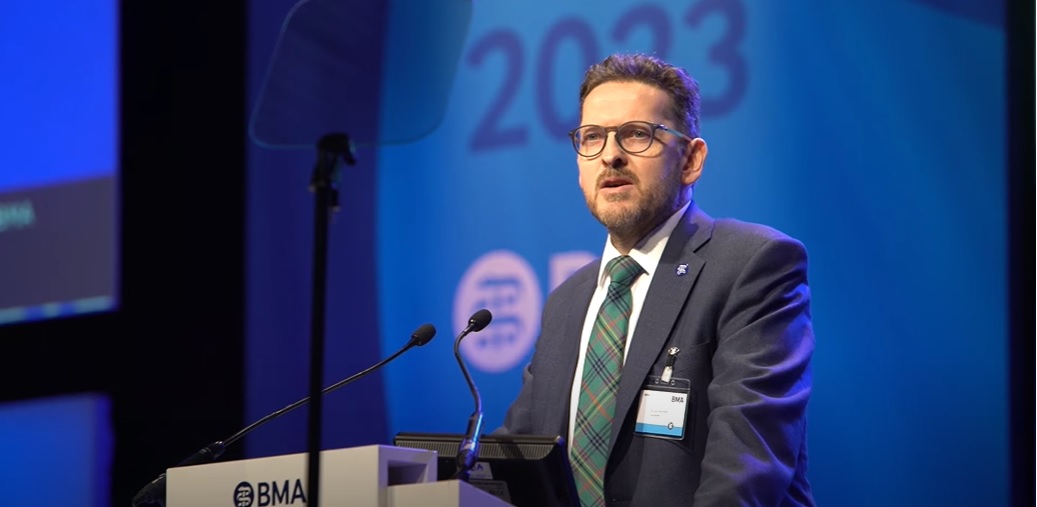Heading into Easter – a time when I hope you will be able to get something of a break if at all possible – I wanted to update you on two key pieces of work I have done as chair over recent times.
Both of them are focussed on our key aim – to get the voice and priorities of doctors heard at the very highest level in Scotland.
COVID INQUIRY
Many of us – in particular those who worked through it – know the terrible toll the pandemic took on the medical profession in Scotland. Whether it is through suffering from long Covid, or the impact on their mental health, many doctors and indeed their colleagues, are still suffering today.
It is vital we learn lessons from what happened so Scotland’s NHS is better prepared next time round and to ensure all those working in healthcare are better protected from this virus and any potential future pandemic. That is why the Scottish Covid Inquiry was set up – and we have been engaging with the Inquiry to represent the views of doctors. That has meant submitting a full witness impact statement – and last week I was called to give evidence on its contents.
The responsibility of speaking on behalf of doctors in this forum is of course huge and weighed heavily – so I sought considerable input from colleagues and experts across the UK. You can watch the evidence session back here.
I hoped to use the session and our witness statement to get several vital points across – but perhaps at the top of that list was just how unprotected doctors were as this deadly virus spread. Not only were there issues with supply and quality of PPE – but the failure to acknowledge the airborne spread of Covid meant that the flimsy Fluid Resistant Surgical Masks (FRSM) we were supplied were frankly virtually useless. We needed – and still do – the protection provided by FFP3 masks. The fact we are still arguing this point is dispiriting – we deserve better now, and absolutely must be better protected should we face a similar challenge again.
There is much more you can read in our statement here – but I will finish this part of the blog by highlighting that our NHS was in no fit state to deal with a pandemic when it hit in 2020. As Covid spread, our NHS was understaffed, under-resourced and struggling to cope with demand. I don’t need to ask if that sounds familiar – as things are the same, if not even worse, today. If we genuinely want a system that can cope with shocks like a pandemic, then we need to properly invest in it, staff it sufficiently to meet demand and finally have a proper, national debate on how we make our NHS fit for the future.
MEETING WITH THE NEW CABINET SECRETARY
Indeed – the need to finally get underway with the national conversation on the future of the NHS, that the Scottish Government is committed to, featured on the agenda for my first meeting with the new Cabinet Secretary for Health Neil Gray which took place at the Parliament earlier this week.
This was a useful and serious discussion – and I welcomed the Cabinet Secretary’s willingness to engage positively and openly on a number of issues. As I am sure you will understand, it would inhibit future discussions of this nature was I to give a full running commentary – but I think there are some important points to highlight. First, the commitment to a national conversation remains strong, and I hope we’ll hear more soon.
I raised the issue of PAs/AAs, and the concerns you – our members have raised – around patient safety and the impact on training opportunities for doctors. The Cabinet Secretary indicated that he understands our point of view – and our concerns. The indications are that he will adopt a similarly cautious approach to the deployment of AAs/PAs in Scotland’s NHS as his predecessor and would look at issues over job titles (I suggested moving away from ‘Associate’) and protecting junior doctor training. There is still much more to do with this – and we haven’t achieved the kind of pause on recruitment or action to protect patients that we are looking for – but it is equally clear that our message is reaching those it needs to, so we will keep pushing.
We also discussed NHS culture – an issue which was hugely topical given the way 29 consultant whistleblowers who exposed the huge issues at A&E at the QEUH in Glasgow and were then ignored by Healthcare Improvement Scotland – the very body they had asked for help and to investigate their concerns. I made the point that it highlighted the kind of culture we fear is felt across much of NHS Scotland, where those raising concerns feel they simply won’t be listened to, or the issues they highlight acted upon. Worse than that – many still feel that they will be victimised or their career will suffer from taking such action. The Cabinet Secretary was clear in his view that this was not the culture in the NHS that he wished to preside over. This is something that has built up for years – and culture change isn’t easy. But we must keep pursuing this and relentlessly highlight its importance for doctors, their colleagues, our patients and their safety. Rest assured at BMA Scotland it’s something which we won’t let up on. Indeed – thanks for responding to the survey I put together on whistleblowing, I’ll say more about that in due course.
In terms of ongoing engagement with Mr Gray on issues around pay for example, that will be down to individual committee chairs to pick up – and I have no doubt they’ll be in touch with you soon. Keep following our blogs, and social media for more – and to ensure you can get involved when we need you to act – as we no doubt will again soon.
Dr Iain Kennedy is Chair of BMA Scotland’s Council.

